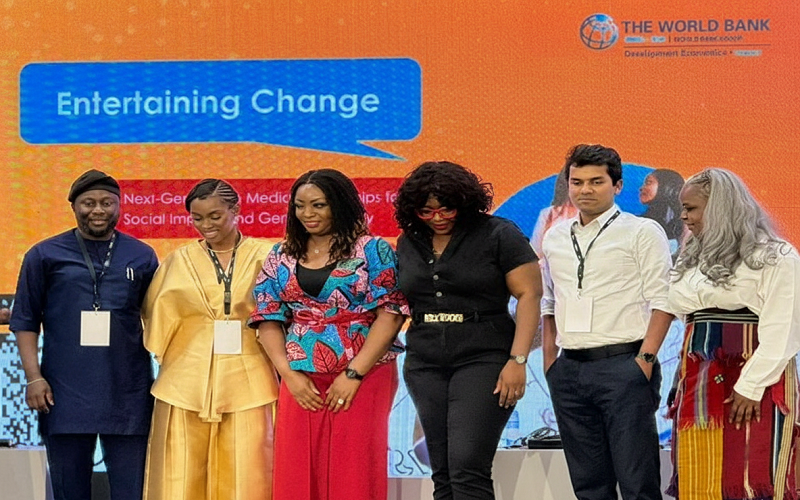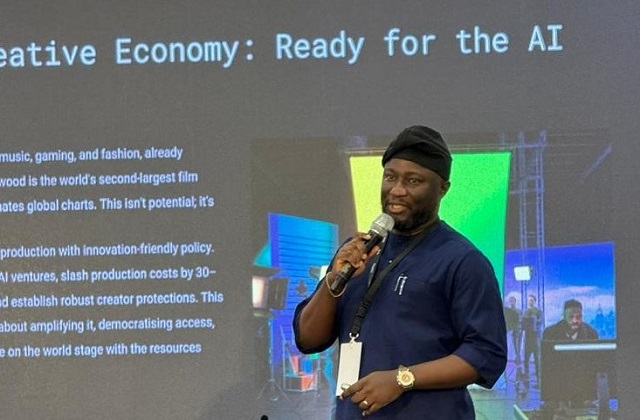Technology entrepreneur and creative economy strategist, Oluwaseun Dania, has delivered a groundbreaking intervention on the future of African storytelling, AI governance, and digital policy at the World Bank and Eden Venture Group’s Entertaining Change: Next-Generation Media Partnerships for Social Impact and Gender Equality event.
Dania is an internationally recognised entrepreneur, digital policy advocate, and creative economy strategist. He is the Founder of Alpha-Geek Technologies, CEO of Crello, and a member of several global bodies, including the Forbes Business Council, Chatham House, World Economic Forum SME Connect, and the Institute of Directors (IoD).
Speaking during a session on AI for Entertainment Media Content: Advancing Impact and Research, Dania outlined how artificial intelligence is poised to unlock unprecedented opportunities for creators, researchers, regulators, and development partners across Africa.
Dania underscored that AI should not be viewed as a threat to human creativity but as a powerful amplifier of it. “Africa’s creative sector already shapes global culture. AI gives our stories reach, scale, and economic force,” he said.
He demonstrated how AI now supports critical production processes such as scriptwriting, editing, visual effects, audio enhancement, audience forecasting, and rights protection, enabling African creators to produce world-class content at a fraction of traditional costs.

Introducing what he described as a “creative and economic breakthrough,” Dania unveiled the Indie-Studio-in-a-Box, a streamlined AI-powered production model that allows small teams of five to eight people to run a complete studio pipeline from a single laptop.
The system integrates AI-assisted script development, virtual pre-visualization, smart on-set tools, automated post-production, multi-language AI dubbing, and AI-enabled IP protection, all within a rapid digital distribution framework.
“A complete African studio can now live inside a laptop,” he declared. “That is a transformative shift for creators and the economy.”
To ensure AI adoption remains ethical and creator-centred, Dania also introduced the A.I.R. Framework, an emerging ethical model for creative AI.
The framework is built around three pillars: Attribution, ensuring clear rights, consent, and credit for creators and performers; Integrity, which mandates watermarking to guarantee transparency in AI-generated or AI-assisted content; and Residuals, which promotes smart-contract systems to ensure creators receive fair and automated compensation whenever their work or likeness is reused.
Beyond technology, Dania called for deeper collaboration between government institutions, Big Tech companies, academia, and the creative industry to embed African contexts into AI development.
He urged universities to update film, media, and computer science curricula to include AI literacy, train creators to recognise and mitigate AI bias, and build culturally relevant datasets and research labs focused on inclusivity and algorithmic fairness.
“If we want AI systems that understand African faces, voices, stories, and social norms, we must build them ourselves through research, curriculum reform, and proactive academic collaboration,” he emphasized.
Dania further proposed the establishment of a Creative AI Regulatory Sandbox, to be led by NITDA in collaboration with NDPC, NFVCB, NBC, NCC, CBN, guilds, universities, and development partners. The sandbox, he said, would allow emerging AI tools to be tested in real-world creative environments to ensure safety, ethics, and scalability before broad implementation.

